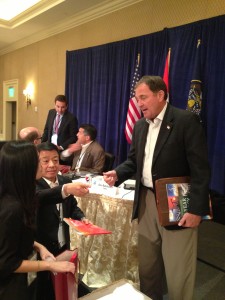Governors, Canadian Premiers and agencies within the Department of the Interior (DOI) met together this month to discuss public lands and endangered species issues that span across state lines.
The Western Governor Association (WGA) 2013 Annual Meeting was mostly concerned with school trust lands immersed in federal conservation areas. The federal government has granted states school trust land located inside federal conservation areas such as national parks or wilderness areas. The states have a congressional mandate to generate income from school trust lands, and the federal government has differing levels of conservation mandates. These federal and state mandates are sometimes viewed as being in direct conflict.

“I think it is important that the states find more efficient, less costly, and more predictable tools in which to rationalize the state trust ownership in every state,” said Allen Freemyer, a representative of the Western States Land Commissioners Association and a representative of the Utah School and Institutional Trust Land Association (SITLA).
Federal-state public land complexities are nothing new. Meetings held by the WGA typically focus on finding middle ground among federal, state and local governments on how to approach conflicting state and federal mandates on school trust lands.
“The majority of Utah is owned by the federal government, which presents a series of unique and difficult problems that can cause frustrations for local, state and federal officials,” said John Tanner, a senior policy advisor for the office of U.S. Senator Orrin Hatch. “In meetings such as the Western Governors Association there are certain agreements and initiatives that need to be discussed and mended. We are glad that it happened in Utah this year and that Governor Herbert was able to chair.”
In addition to discussing public land issues, the WGA also focused on endangered species. Animals aloof to state lines and state-federal public land disputes frequently require government coordination efforts to keep animals off the endangered species list.
“Animals don’t recognize political boundaries,” Tanner said. “We have species like the sage grouse that, if listed as endangered, it will impact the economies of all the western states. It is important that states work together so species don’t need federal protection.”
Public land issues and endangered species contravention have a reputation for being highly specialized topics. Members of the general public are frequently frustrated when they learn that certain lands are off limits and that valuable resources such as oil are being denied a starving economy. Politicians and other officials are often heard asking for patience as they operate under a complex set of jurisdictions. As Colorado’s governor, John Hickenlooper told those gathered at this month’s conference, “The devil is in the details.”
An elected state official’s pressure to perform in state interest was apparent as words such as ‘red tape’ and ‘sequestration’ were volleyed between governors and DOI agencies at the conference. Dan Ashe, director of the U.S. Fish and Wildlife Service, proposed a perspective to negotiate a middle ground between the state-federal perspectives. He said the various state and federal agencies involved should avoid shortchanging their financial resources while depending on other overlapping services to take up the slack.
“We are in a period of time where we want things to go faster and we use words like ‘streamline’ and ‘reduce red-tape,’ which of course is always the desire. Also, we are at a time where we have fewer dollars, certainly at a federal level. … You have three things while thinking about a job: fast, cheap, and good. You can (only) have two of the three,” Ashe said. “You can’t have them all, so … If you want fast and cheap, it’s not going to be good. And so as I think about these issues such as streamline, ‘make it faster’ and at the same time we want to spend less money, that says to me fast and cheap, which means that it is not going to be good. It is not going to be a solution that lasts.”
He said employees responsible for special projects requiring a high level of coordination should be given more departmental support, both at the state and federal levels.
“(We need to) get people who are well intentioned … the time and resources that they need to do the job,” Ashe said. “Then we will have a job that lasts, and it will be better for the American economy, better for the species, and better for all of us all around.”




